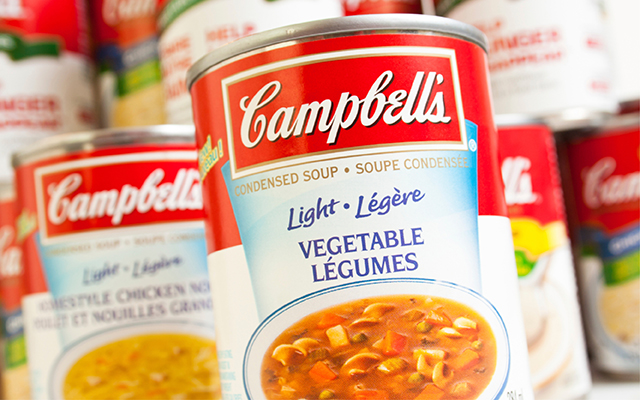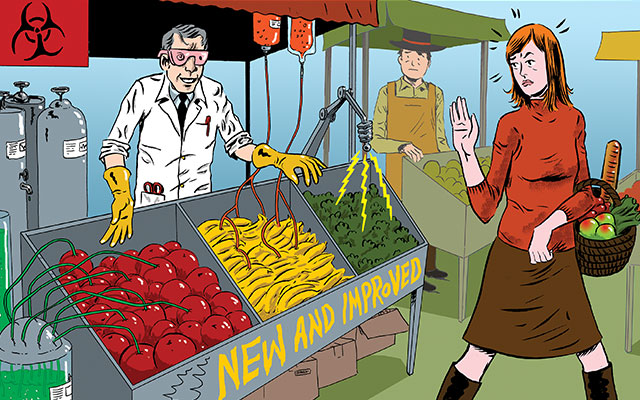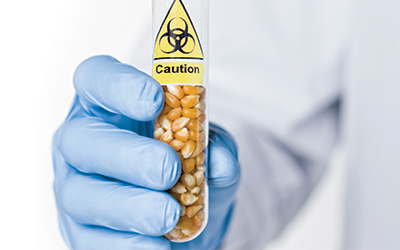Less than four years after spending more than $1 million to defeat ballot initiatives that would require mandatory labeling of products containing genetically modified ingredients, Campbell Soup announced this month that it will begin to disclose that information on all its brands.
The move, the first by a major U.S. food company, is part of a larger strategy by the iconic soupmaker — whose family of brands includes Pepperidge Farm, Prego, and V8 — to spur long-sought federal action on a mandatory GMO labeling system that would preempt a patchwork of labeling laws at the state level.
“We will withdraw from any coalition that doesn’t support mandatory labeling,” Campbell CEO Denise Morrison told the New York Times. “We were involved in fighting the state ballots in California and Washington out of concern over a state-by-state patchwork, yet we didn’t participate in the fights in any other state beyond those. Any money we did spend after that was in support of seeking a federal solution.”
Vermont is the only state with a mandatory GMO labeling law on the books, and companies have struggled to deal with the quirks in the law before it goes into effect in July. Campbell’s SpaghettiOs, for example, is required to disclose any GMO ingredients, but its SpaghettiOs with Meatballs is not. That’s because the law only affects products overseen by the Food and Drug Administration. Add meat to a product and it lands in the purview of the Department of Agriculture — and is exempt from the labeling requirement.
“A state-by-state patchwork could be incredibly costly not only for our company but for the entire industry,” said Morrison. “That’s why we want the federal government to come up with a national standard that is mandatory.”
Morrison has an ally in U.S. agriculture secretary Tom Vilsack, who in December told the Des Moines Register he was trying to convene industry leaders and hammer out a compromise before the Vermont law takes effect. With anti-GMO initiatives percolating in several states across the country, Vilsack said he was worried about the chaos that could ensue without a uniform national standard. “I’m going to challenge them to get this thing fixed,” he said.
While Morrison said she’s optimistic that a compromise can be reached, she will move ahead in the next 12 to 18 months to label about three-quarters of Campbell’s products — all those containing ingredients made from corn, sugar beets, soybeans, or canola. The decision may pay dividends whether or not federal action is forthcoming, as consumer demand has already begun to force the industry to question its longtime opposition to GMO labeling.
“We’ve always believed consumers have a right to know what’s in their food,” Morrison said. “We know that 92 percent of Americans support GMO labeling, and transparency is a critical part of our purpose.”
General Mills, Tropicana, and other industry giants have recently responded to consumer calls for non-GMO brands and GMO labeling, and retailers are climbing on the bandwagon as well. Beginning in 2018, Whole Foods Markets will require all of its suppliers to provide GMO labeling on their products. Meanwhile, even mainstream grocery chains, such as Kroger and Safeway, are increasing their selection of non-GMO organic products.
These, however, remain relative outliers among Big Food. The Coalition for Safe Affordable Food, an industry trade group, responded with predictable chilliness to the Campbell announcement. “While individual companies are free to make labeling decisions that are best for their business,” the coalition said in a statement published in the Wall Street Journal, “it remains the overwhelming consensus that on-package labeling of foods made with GMOs is unnecessary, inherently misleading, and will drive up food prices for consumers.”
And, despite its stance on GMOs and Morrison’s professed commitment to transparency, Campbell may not be as much of an outlier as it would like us to think. Last year, when the FDA proposed that companies disclose how much added sugar is in their products, Campbell was an early and fierce opponent, according to a piece in the Los Angeles Times. “Such information,” the company’s director of regulatory affairs wrote in a letter to the agency, “could confuse consumers by taking their focus off of calories.”
Keep your focus on healthy, whole foods by learning more about GMOs. Check out “Frankenfood = Genetically Modified Foods” in our June 2013 issue.
TELL US: What’s your take on GMO labeling? What food companies would you like to see make the change? Leave a comment below or share your thoughts with us on Facebook or Twitter.




This Post Has 0 Comments